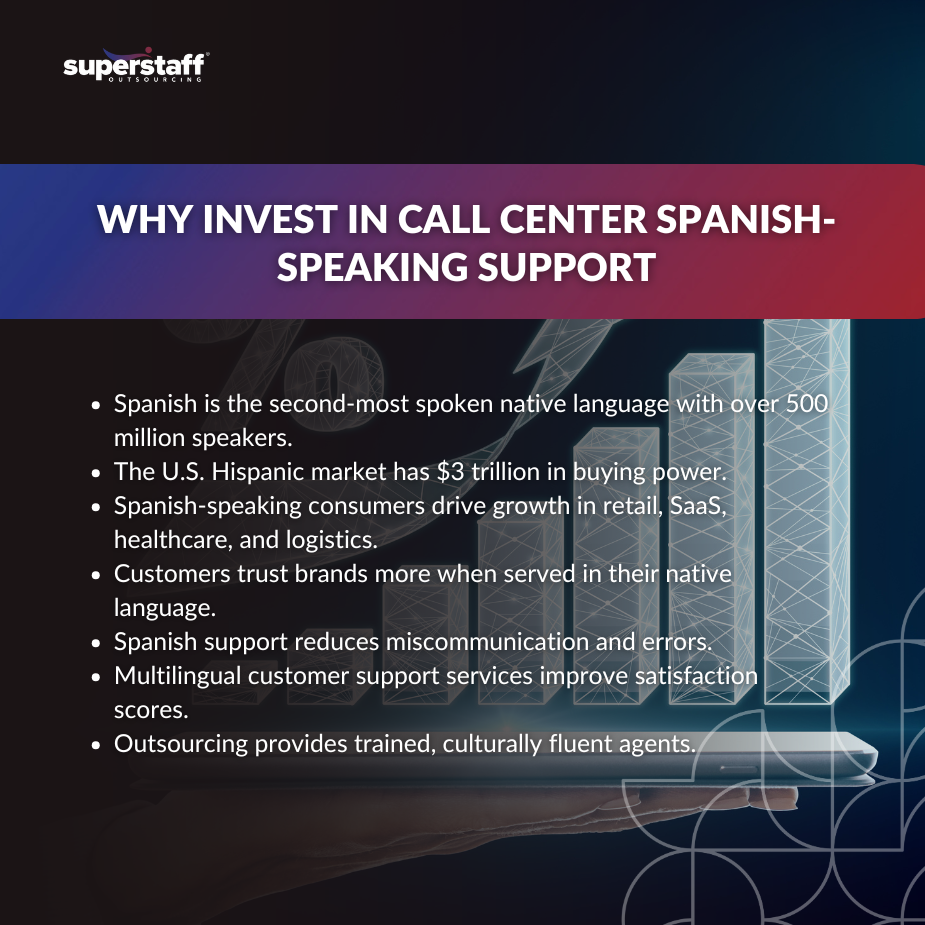
More than 500 million people worldwide speak Spanish, making it the second-most spoken native language on the planet and one of the most influential in global commerce. In the United States alone, Hispanic consumers represent over $3 trillion in buying power—a market force businesses cannot afford to ignore. For companies with international ambitions, investing in call center Spanish speaking support is no longer optional; it’s a direct pathway to tapping into some of the world’s fastest-growing markets.
Spanish is not just another language on the global stage—it is a strategic asset. From Latin America’s emerging economies to the booming U.S. Hispanic market, Spanish speakers are shaping demand across industries from retail to technology to financial services. Meeting these consumers in their native language goes beyond convenience. It builds trust, eliminates friction, and signals a brand’s commitment to inclusion and customer care.
That’s why Spanish-language customer support should not be viewed as a simple service upgrade. It is a gateway to business expansion, stronger customer loyalty, and measurable revenue growth. Companies that prioritize this strategy position themselves to capture market share, reduce churn, and create long-lasting brand advocates.
In this blog, we’ll explore why Spanish support is a business-critical advantage, how outsourcing makes it scalable and efficient, and what operational considerations companies need to succeed. By the end, you’ll see how the right Spanish-speaking support team can transform global customer engagement into real business success.
Spanish is the Language of Vast, High-Potential Markets
Spanish is more than a widely spoken language—it is a gateway to global economic opportunity. Across three major regions—Latin America, Spain, and the U.S.—Spanish-speaking populations are not only growing but exerting outsized influence on trade, consumption, and cultural trends.
Purchasing Power and Market Growth Trends
- Latin America represents more than 650 million people, with over 480 million Spanish speakers across the region. Economies such as Mexico, Colombia, and Chile are becoming increasingly attractive for global trade, while countries like Argentina and Peru are investing in digital innovation.
- Spain serves as a bridge to European markets, with strong demand for technology, e-commerce, and financial services. Its position within the EU makes Spanish-language support a competitive edge for companies operating across Europe.
- In the United States, the Hispanic market is one of the most influential demographic segments. With $3 trillion in buying power, U.S. Hispanics outpace the GDP of entire nations. Their spending patterns shape retail, finance, entertainment, and technology sectors.
Industry Sectors Most Influenced by Spanish-Speaking Consumers
Spanish-speaking populations are major drivers in industries such as:
- Retail and E-Commerce: With growing access to digital platforms, Latin American shoppers demand localized experiences.
- Healthcare: Spanish-language communication is vital in serving Hispanic populations in the U.S.
- Technology and SaaS: Spanish-speaking users form a growing base of digital product adoption.
- Logistics and Supply Chain: Latin America is a critical hub for global trade, requiring seamless bilingual support for cross-border operations.
The Global Reach of Bilingual Communication in Business
Bilingual communication, particularly in multilingual customer support services, is not simply about expanding reach. It creates inclusivity, builds credibility, and positions brands as global players. Businesses that offer call center Spanish speaking solutions can instantly differentiate themselves in markets where language accessibility directly affects customer loyalty.
With the market opportunity clear, the question becomes—how can businesses connect effectively?

Why Outsource Spanish Language Support Services
Here’s the truth: customer experience (CX) improves significantly when clients are served in their native language.
A customer’s preferred language is more than a mode of communication—it is an emotional anchor. When businesses interact with Spanish-speaking customers in their native language, they are delivering respect, clarity, and comfort.
Emotional Connection Through Native Language Interactions
Customers feel more valued when brands make the effort to communicate in their language. This emotional bond translates into higher trust and stronger loyalty. In a competitive market, that emotional edge can determine whether a customer stays or switches to a competitor.
Reduced Miscommunication and Errors
Language barriers create friction—whether in product explanations, technical troubleshooting, or billing inquiries. Spanish technical support eliminates these gaps, ensuring accuracy and faster problem resolution. Reduced errors mean fewer escalations, saving companies time and resources.
Higher Satisfaction Scores in Multilingual Support Environments
Research consistently shows that customers rate their experiences higher when served in their native language. Offering multilingual customer support services, particularly in Spanish, directly correlates with higher Net Promoter Scores (NPS) and Customer Satisfaction Scores (CSAT).
This improved customer experience translates directly into tangible business benefits.
Spanish-Language Support Can Drive Measurable Revenue Growth
Customer satisfaction is important—but revenue growth is the ultimate business outcome. Spanish-language support directly impacts a company’s bottom line.
Upselling and Cross-Selling Opportunities
When customers fully understand product features or promotions, they are more likely to make additional purchases. Spanish-speaking agents can effectively communicate upsell opportunities and cross-sell complementary products without losing nuance.
Repeat Business from Satisfied Customers
Happy customers become loyal customers. Brands offering call center Spanish speaking services see higher repeat purchase rates and long-term retention. In industries like retail, SaaS, and banking, retention is far more profitable than constant new acquisition.
Brand Advocacy in Spanish-Speaking Communities
Satisfied Spanish-speaking customers often turn into brand advocates. Word-of-mouth spreads quickly across Hispanic communities, both online and offline. This advocacy can generate organic growth, reduce marketing costs, and build long-term equity.
Delivering on this potential requires more than just hiring bilingual staff—it demands a strategic outsourcing approach.
Outsourcing Spanish Support Offers Scalability and Specialized Expertise
For many businesses, the smartest way to meet this demand is to outsource Spanish language support services. Outsourcing not only addresses resource gaps but also provides a competitive edge.
Access to Trained, Culturally Fluent Agents
Outsourcing partners provide teams with both linguistic and cultural fluency. These agents understand nuances such as regional Spanish differences, formal versus informal speech, and cultural expectations in customer interactions.
Cost-Effective Scaling for Seasonal or Market-Specific Needs
Spanish-speaking demand often spikes during holiday seasons, product launches, or geographic expansions. Outsourcing provides the ability to scale up or down quickly without the heavy investment of in-house recruitment and training.
24/7 Coverage Without Overburdening In-House Teams
Global markets never sleep. Outsourcing Spanish support ensures round-the-clock service without exhausting internal resources. A call center Spanish speaking team can provide 24/7 availability, enhancing customer satisfaction and operational resilience.
With outsourcing as a solution, execution becomes the next focus.
Integrating Spanish-Speaking Support Requires Cultural as Well as Linguistic Alignment
Language is only one part of the equation—cultural competence is just as critical. Without it, even perfectly translated interactions can fall flat.
Understanding Regional Variations in Spanish
Spanish differs greatly between Mexico, Spain, Argentina, and Colombia. Successful support teams adjust vocabulary and idioms based on the customer’s region to avoid misunderstandings.
Adapting Tone, Formality, and Expressions to Cultural Norms
In some regions, formality conveys respect, while in others, a conversational tone builds trust. Outsourced teams trained in cultural sensitivity know how to adapt seamlessly.
Avoiding Missteps That Can Damage Customer Trust
Poorly adapted Spanish can come across as robotic, awkward, or even disrespectful. Outsourcing ensures professional, culturally aware interactions that preserve brand integrity.
When cultural fluency is paired with operational efficiency, the results can transform a brand’s global standing.
Partner With the Call Center Spanish Speaking Professionals at SuperStaff Colombia
Offering Spanish-language support is more than a customer service upgrade—it is a strategic growth driver. From accessing vast markets to building emotional connections, improving revenue, and ensuring cultural alignment, Spanish-language support is central to global business success.
By leveraging call center Spanish speaking teams through outsourcing, companies gain access to specialized expertise, cost efficiency, and scalability. From retail and SaaS to logistics and healthcare, the impact is clear: Spanish-speaking customers want to engage in their language, and businesses that deliver will thrive.
Now is the time to act. Don’t let language barriers limit your business potential. Partner with SuperStaff for Spanish-speaking support solutions that not only meet customer needs but unlock entirely new growth opportunities. If you’re ready to expand into Spanish-speaking markets, SuperStaff can help you turn language fluency into global business success.






